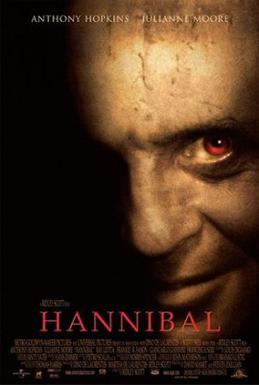Hannibal 
Ten years after the solving of the Buffalo Bill case, FBI Agent Clarice Starling is tasked with tracking down another mass-murderer – the man who aided (and analysed) her, Hannibal “The Cannibal” Lector (Anthony Hopkins). But, she’s not the only one. A surviving victim, Mason Verger (Gary Oldman), is seeking revenge and will pay anything to get Lector. Lector’s world is closing in, or at least, so it seems…
Ridley Scott’s follow-up to
The Silence of the Lambs met with what could be charitably described as chilly reception upon its release. Audiences balked at all the allusions to classical literature. Moral watchdogs were foaming at the mouth about some of its more twisted moments. The critics that weren’t outright hostile towards the film still compared it in an unfavourable light to Jonathan Demme’s film.
Hannibal was a box-office hit but it was (and still is) seen as a major misstep in Scott’s career after the success of
Gladiator.
However, I disagree with this assessment. While I concede that
The Silence of the Lambs is a decent film, it is a vastly overrated one. It is a film so worried about being seen as a mere horror film, that it shifts awkwardly from gritty procedural to Gothic camp. It is this writer’s controversial opinion that not only is Scott’s film the superior offering, it is one of the finest films of the 2000s.
Hannibal is one of those lucky miracles of the Hollywood system. Often, big-budget films are micro-managed by a committee so as to guarantee massive returns. But,
Hannibal was different. It didn’t really matter too much what the film was about, as long as the film had Hannibal Lector and Clarice Starling. This creative indifference gave Scott free reign to make the film he wanted. The result is perhaps the closest a mainstream Hollywood film has come to arthouse.
Hannibal operates as reflection of Dante’s
Inferno. With the exception of Starling, there are no innocents in this film. The characters that populate the world of
Hannibal are ones consumed by greed, vengeance, violence and hate. Certainly, some are more sympathetic than others but as in Dante’s text, Hell doesn’t play favourites, and each meet their “righteous” punishment in the form of Lector.
The use of unsavoury characters as victims have led many to accuse the film of transforming Lector into a “kuddly killer.” And while this is an accusation I would happily throw at Thomas Harris’ book (who only wrote the book to shut his fans and publishers up), it is dismissing the film's thematic connection to the
Divine Comedy.
As much as Alighieri loved Beatrice, so too does Lector love Clarice. To Lector, she is Heaven personified. She is beautiful, and she is (at least in his eyes) trying to stop the forces that pervert the world we live in. She represents the best of humanity, and is the exact opposite of those he punishes. However, for as much as they share an abhorrence for corruption, he too is guilty of sin and will never be worthy of her pureness. While discussing an opera based on Dante’s work, Lector asks “Could he daily feel a stab of hunger for her and find nourishment in the very sight of her? I think so. But would she see through the bars of his plight and ache for him?” It is these words that describe the tragedy and heartache of Lector himself.
Yet, before you think
Hannibal is just a load of chin-stroking musings (or “artsy-fartsy” as Ray Liotta’s Paul Krendler would say), the film still delivers as entertainment. Whereas
The Silence of the Lambs shied away from most of its horror excesses, Scott is happy to wallow in them. His film is a masterful example of Grand Guignol horrors and black comedy.
Hannibal is rather sick in parts (one scene towards the end will turn anyone's stomach), but thanks to the liberal use of classical music and the stellar performances by the cast (both Hopkins and Oldman chew through more scenery than flesh is devoured), the film never feels overly sadistic.
Hannibal is an unfairly maligned film. The critics that trashed it were unable to get over that it wasn’t
The Silence of the Lambs Part II. It’s their loss, however. Scott’s film is one of his most daring. His marriage of lush visuals (John Mathieson’s lighting in the lead-up to the pig-pen should have won him an Oscar alone), a haunting score (possibly Hans Zimmer’s finest work since
Going for Gold), and a script front-loaded with references to classical literature (by Steven Zaillian), has created a cinematic experience that can be likened to opera.
If you haven’t seen since the film, or haven’t seen it since its release, give it another watch. I’m sure you will find it a much better film upon reflection. Don’t be afraid of the still-negative reception. As Lector’s mother would say “it is always important to try new things.”
Bon Appetit!